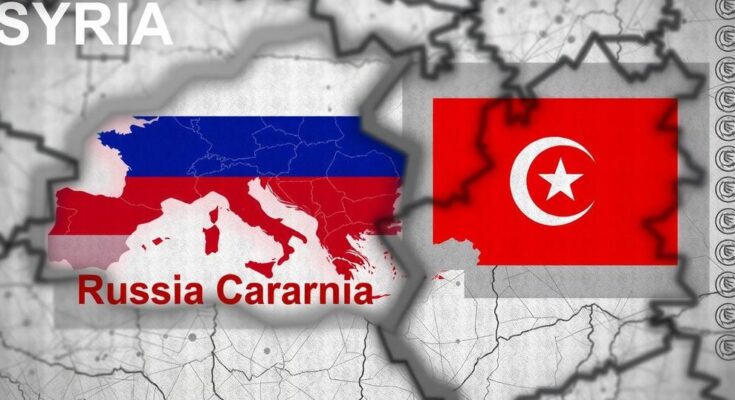Russia is shifting its focus from Syria to Libya following Assad’s weakening position. This transition underscores Moscow’s strategic recalibration, with dependence on local actors like Haftar posing risks. The West must enhance its understanding of these dynamics and prioritize stability over opportunistic alliances, given Haftar’s reliance on Russian support.
The recent events in Syria signify a notable transition in Russia’s foreign policy as it begins shifting its focus toward Libya. Historically, Syria has served as a critical point for Russia’s global assertiveness; however, the recent developments illustrate the precarious nature of relationships formed through coercive means. The collapse of the Syrian regime under Bashar al-Assad highlights the limitations of such alliances, compelling Russia to seek new opportunities elsewhere, particularly in Libya. Moscow’s strategic realignment toward Libya is evidenced by its repositioning of military assets and its support of Khalifa Haftar, the leader of the Libyan National Army (LNA).
The renewed focus in Libya represents a continuation of Russia’s historical objectives—projecting power and challenging Western influence in the Mediterranean region. The connections between Haftar and Russian interests are clear; both figures leverage external political dynamics for their survival. While Moscow’s involvement in Syria may be evolving, its increased presence in Libya serves to underscore its aims of expanding its geopolitical footprint in North Africa. Haftar’s dependency on Russian backing is significant, as he maneuvers amidst complex internal and external pressures, reflecting a transactional approach that breeds certain vulnerabilities.
The West, particularly Washington, faces a significant challenge in addressing Russia’s increasing influence in Libya, especially given its earlier disengagement from the region. The misconception that Haftar can easily shift allegiances highlights a misunderstanding of the intricacies of his dependence on Moscow. Haftar’s political machinations and reliance on Russian military capabilities suggest that he is not the independent actor that Western policymakers might hope to enlist in countering Moscow.
Ultimately, the West must recast its strategy for Libya. Rather than pursuing fleeting alliances with figures such as Haftar, it should concentrate on the structural weaknesses that permit external exploitation of Libya’s political landscape. An emphasis on building robust governance, fostering economic resilience, and facilitating inclusive political dialogues will be imperative for stabilizing the region and mitigating the adverse impacts of foreign interventions. Success in Libya will hinge on a coherent and proactive Western stance that acknowledges past missteps and learns from the ongoing dynamics in the region.
The article focuses on Russia’s shifting foreign policy strategy from Syria to Libya, particularly in light of the recent political upheaval in Syria where Bashar al-Assad’s regime exhibited vulnerabilities despite substantial Russian support. It analyzes the implications of Moscow’s pivot to Libya, where it aims to bolster its influence through strategic alliances with authoritarian figures like Khalifa Haftar. Furthermore, it critiques the West’s response to these developments, emphasizing the need for a coordinated approach to counter Russian advances and promote stability in Libya.
In summary, the West must reassess its understanding of the dynamics at play in Libya and avoid the pitfalls of underestimating Haftar’s dependence on Russia. A proactive approach addressing Libya’s structural challenges—rather than reactive alliances—will be necessary for establishing long-term stability. The broader lesson gleaned from the situations in Syria and Libya emphasizes the critical importance of early intervention and strategic coherence in maintaining geopolitical interests and preventing foreign domination over fragile states.
Original Source: www.atlanticcouncil.org




